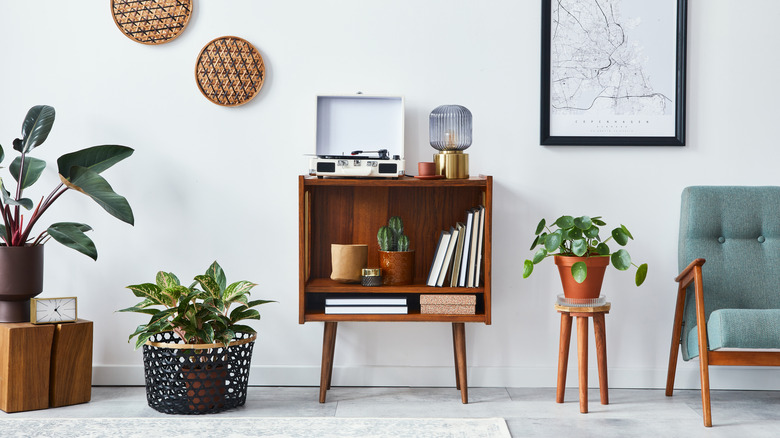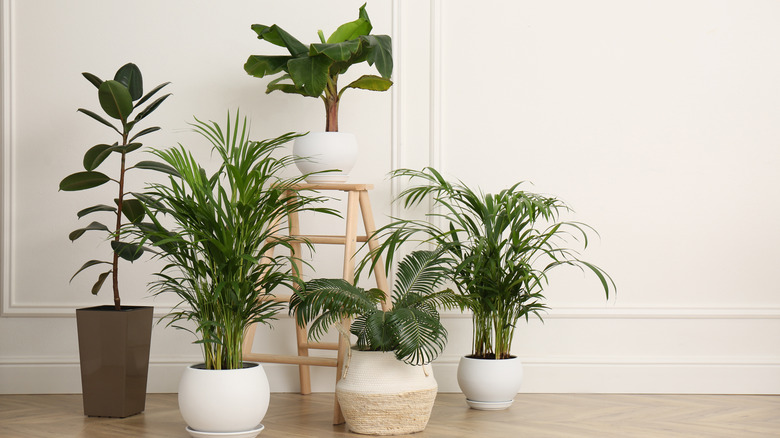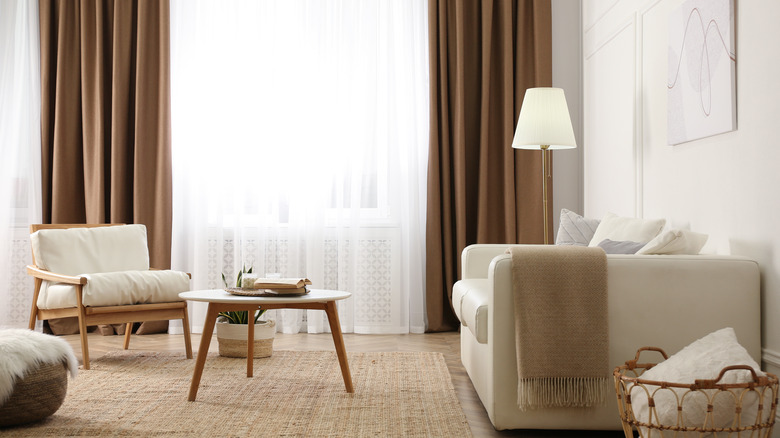How To Feng Shui Your Living Room
Literally meaning "wind and water," feng shui is more than just a buzzy home design term for SoCal yuppies. It is rooted in Taoism and ancient Chinese tradition, withstanding the tests of time and proving itself to be more a philosophy of connection to the natural world. This is done by incorporating the five elements — wood, water, fire, metal, and earth, according to The Spruce. Feng shui helps one to obtain qi (pronounced chee), a harmonious balance of energy.
It can be intimidating to take on "feng shuiing" your own place, but with a few helpful tips, you'll realize you can easily incorporate some of the basic tenets and obtain a greater flow of energy in your room. A great place to start is your living room since that is where many people spend the majority of their time and where you typically host guests. Using our guide, we'll provide a few ideas to bring the principles of feng shui into your living room.
Find small ways to incorporate the elements
Keep the five elements in mind throughout each step of the process. There are dozens of ways to seamlessly incorporate water, wood, fire, earth, and metal into any design aesthetic and in keeping with your budget. While you may not be able to build a new fireplace in your living room, consider using unscented candles to open surfaces. If you aren't falling in love with any water features or don't want to bother with the upkeep, there are other nonliteral ways of adding it into your design. Water is also associated with yin, as explained by Love to Know, so it is associated with dark colors. Adding charcoal throw pillows or navy blue throw blankets into your design is a great way to incorporate water.
Deciding to feng shui your home does not always mean dropping major cash at a furniture store — it can just as easily be working with the objects you already have and aligning them with feng shui principles.
Enjoy the many benefits of house plants
There are endless benefits to having house plants in your home, such as improved air quality and producing a calming effect, as noted by The Sill. They are also an excellent way to blend the earth element into your living room. Connecting with the larger natural world inside of your home is one of the key principles of feng shui, and nurturing a plant with proper soil, sun, and watering is a key way to do so. They can also be affordable accessories, especially if you propagate from existing plants.
We won't go so far as to say you can never have too many plants. You can! You don't want plants that obstruct pathways either physically or visually. Plants that extend beyond their allotted area can become their own kind of clutter, causing a bad energy block and adding to feelings of stress and overwhelm. So if you don't have a place in mind for a new plant or will have to squish it onto a ledge, skip adding a new plant to your collection.
Remove clutter from your living room
When you've come home from a long day, it can be tempting to drop your bag, put your feet up on the couch, and kick your shoes off. But this is a big no in the world of feng shui. While it may feel temporarily better to head immediately into relaxation mode, you will likely feel your mind wandering, thinking about how eventually you will have to get off the sofa and tidy up. Clutter is hard to avoid unless you build solid, quick routines, so it doesn't accumulate in the first place.
House Cleaning Tips recommends using David Allen's 2-minute rule for keeping your house clutter-free. If you are thinking about a task and determine it will take less than 2 minutes to complete, do it now. Otherwise, you expend more time thinking about and dreading the task than you would actually do it. This sounds simple, but even consider a soda can you meant to put into the recycling can. This task will likely take even less than 30 seconds, and as soon as it's gone, you can check it off your mental checklist.
Following these few basic principles will help you to begin integrating feng shui into your living room. For more help, check out our piece on the things in your house that may be draining your qi.



